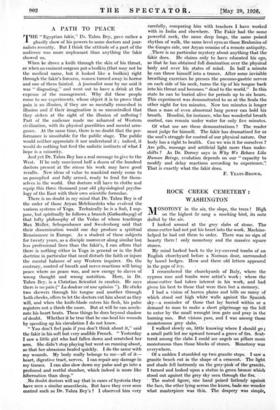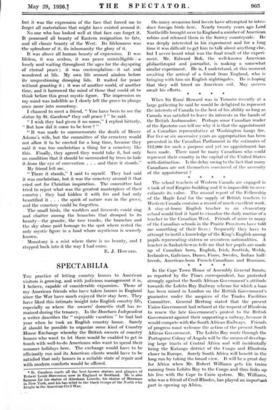ROCK CREEK CEMETERY : WASHINGTON
MONOTONY in the air, the slope, the trees ! High on the highest fir sang a mocking bird, its note dulled by_ the air.
I looked around at the grey slabs of. stone. The stone-cutter had not put his heart into the work. Machine- helped he had cut them to order. There was no sign of beauty there ! only monotony and the massive square stones.
My mind harked back to the ivy-covered tombs of an English churchyard before a Norman door, surrounded - by laurel hedges. Here and there old letters appeared in the gaps of ivy.
I remembered the churchyards of Italy, where the cypress rose and tombs were artist's work ;- where the stone-cutter had taken interest - in his work, and had given his best to those that were then but -a Meinory.
I had a vision of barren plains and hills on many of which stood- out high white Walls against the Spanish sky—a reminder of those that lay buried within or a demand to man to make a short pilgrimage uP the hill to enter -by the small wrought iron gate and pray in the burning sun. But visionS_ pass, and I was among those monotonous grey slabs.• ' • I walked slowly on, little knoWing where I should go ; a small path- led me upward toward a grove of firs. Scat- tered among the slabs I could see angels on pillars more monotonous than those blocks of stones. Monotony was everywhere.
Of a sudden I stumbled up two granite steps. I saw a granite bench cut in the shape of a crescent The light and shade fell lustrously on the grey:pink' of the granite. I turned and looked upon a statue in green -bronze which stood out against the grey sky seen through the firs.
' The seated" figure; One hand poised listlessly against the face, the other lying across the knees, bade me wonder what masterpiece was this. The drapery was simple, :but it was the expression of the face that forced me to ;forget all materialism that might have existed around it.
No one who has looked well at that face can forget it. It possessed all beauty of Eastern resignation to fate, and all classic beauty of the West. Its lifelessness was the splendour of it, its inhumanity the glory of it.
It was above all human beauty of expression. It was lifeless, it was sexless, it was peace unintelligible-1:--a lonely soul waiting throughout the ages for the daySpring of eternal peace ; it was contemplation—it sat and wondered at life. My own life seemed aimless before its unquestioning drooping lids. It waited for peace without granting it ; it was of another world, of another time, and it harrowed the mind of those that could sit to think before this great mystic figure. The impression on my mind was indelible as I slowly left the grove to plunge once more into monotony.
I chanced to meet a friend, " You have been to see the -statue by St. Gaudens* they call peace ? " he said.
" I wish they had given it no name," I replied bitterly. " But how did it come to be here ? "
" It was made to commemorate the death of Henry Adams's wife, but the committee of the cemetery would not allow it to be erected for a long time, because they said it was too unchristian a thing for a cemetery like this. Finally, they agreed they would take it, but only on condition that it should be surrounded by trees to hide it. from the eye of convention . . . and there it stands."
My friend left me.
" There it stands," I said to myself. They had said it was unchristian, but it was the cemetery around it that cried out for Christian inspiration. The committee had tried to reject what was the greatest masterpiece of their country ; they had hidden it with firs and had only beautified it . . . the spirit of nature was in the grove, and the cemetery could be forgotten.
The small birds, the warblers and firecrests could sing and chatter among the branches that drooped to its beauty---the granite, the tree trunks, the branches and 'the sky alone paid homage to the spot where rested the only mystic figure in a land where mysticism is scarcely known.
' Monotony is a mist where there is no beauty,' and I stepped back into it the way I had come.
E. J. HOWARD.











































 Previous page
Previous page